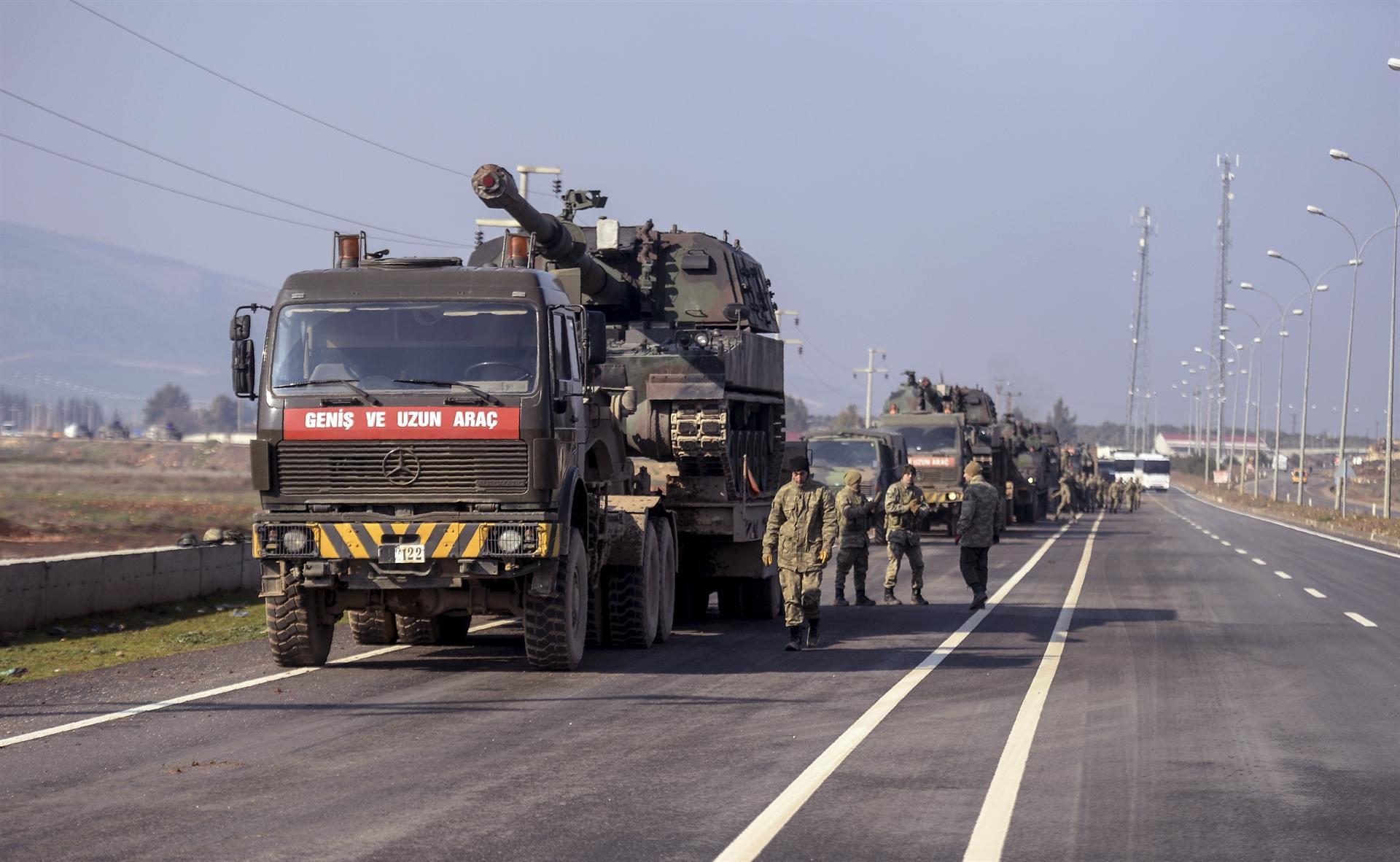
Turkish troops and artillery prepare to enter Syria, in Reyhanlı, Hatay, Turkey, on Feb. 14, 2020. (AP Photo)
A Turkish delegation will visit Russia on Feb. 17 to discuss the situation in Idlib in northwestern Syria, according to Turkey’s top diplomat, after a recent spike in violence in the region.
"The Turkish delegation on [Feb. 17] will attend talks in Moscow [on Idlib]," Mevlüt Çavuşoğlu
“Mr. President [Recep Tayyip Erdoğan] have already expressed our determination. We wish to accomplish this via diplomacy in the meetings we have held and will hold with Russia,” Çavuşoğlu said.
The minister’s remarks came while talking to reporters after a meeting with his German counterpart Heiko Maas on the sidelines of the Munich Security Conference. Çavuşoğlu said he discussed the situation in Idlib with Maas.
Turkish, Russian ministers to meet on sidelines of Munich conference

He asserted that the Syrian regime recently intensified its aggression because it believed in a military solution to the conflict rather than a political one.
"We want to see visible support from Germany and the other European countries and the European Union, as we saw from the U.K. and the U.S.," he added.
"If we can't stop this, there will be a great humanitarian tragedy," the top diplomat underlined.
Çavuşoğlu said briquette dwellings built on the Turkish border for Syrians fleeing Idlib with the help of Germany were only a temporary solution.
Turkey wants to solve issues with Russia over Idlib through diplomacy but will take other steps if necessary, the top diplomat added.
“The regime does not only target innocent people, but also our soldiers in our observation posts at the field,” he said.
“It is not possible for us to tolerate this,” the minister underlined.
For his part, Maas urged Russia to use its influence on the Assad regime to "stop attacks in Idlib."
He said Germany's "great fear" was that a humanitarian catastrophe might occur in Idlib if clashes did not cease in the region.
Maas told reporters that he has conveyed Germany's concerns over Idlib, during his meeting with Russian Foreign Minister Sergey Lavrov on Feb. 15 morning.
"We expect from the Russian side to use its influence on the Assad regime so that these attacks could stop," he said, warning that if attacks continue, this would lead to a greater refugee influx from the Idlib region.
Maas expressed hope that talks between Turkey and Russia next week might help achieve progress to prevent a humanitarian catastrophe in Idlib.
In the meantime, Turkish Vice President Fuat Oktay said that Ankara has fulfilled its responsibilities in Idlib in line with its de-escalation agreements with Russia and Iran.
Oktay told private broadcaster NTV that Turkey was determined to stop the Syrian regime's advances in Idlib and Ankara had clearly conveyed its position on Idlib to Moscow during the talks.
"We cannot overlook the cruelty happening in our neighbor," Oktay said, adding that Turkey, which hosts more than 3.6 million Syrian refugees, cannot handle a new migrant wave from Idlib where hundreds of thousands have been displaced.
"Turkey has fulfilled its responsibilities in Idlib. Some of our observation posts have now fallen into areas controlled by the [Syrian] regime," he said, referring to Turkey's military observation posts established in Idlib under the 2018 deal.
Turkey and Russia, which back opposing sides in the conflict, agreed in 2018 to set up a de-escalation zone in the region. But a Syrian regime's offensive has disrupted Ankara and Moscow's fragile cooperation after 13 Turkish soldiers were killed by Syrian attacks in the past two weeks.
Ankara has said it will use military power to drive back the Syrian forces unless they withdraw by the end of February. Erdoğan threatened to strike regime forces anywhere in Syria if another Turkish soldier was hurt.
Erdoğan says Turkey will hit regime forces anywhere if troops hurt

Turkey remains the country with the most refugees in the world, hosting more than 3.7 million migrants since the start of the Syrian civil war in 2011.
Haftar violating ceasefire, must be stopped
Çavuşoğlu also said that Libyan military commander Khalifa Haftar is “constantly violating” a ceasefire in the country, saying he "must be stopped" so a political solution could be found.
Turkey backs the internationally recognized government of Fayez al-Sarraj in Libya and has sent military personnel to the country in support of Sarraj.
President Erdoğan has also warned that Ankara may deploy troops there if necessary.
Speaking at a news conference with Maas, Çavuşoğlu said that Haftar, who is based in east Libya, wanted a military solution to the conflict rather than a political one.
Haftar-affiliated militias increased rocket attacks on capital Tripoli earlier this week.
One civilian was killed in Libya as a result of a rocket attack in the east of Tripoli by militia forces loyal to Haftar.
A 50-year-old civilian was reportedly killed when a rocket fell on a farm, the media office of the Burkan Al-Ghadab (Volcano of Rage) Operation by Libya's U.N.-recognized government said.
It was said that the civilian was exposed to a rocket attack while watering trees.
As a result of attacks on Feb. 12 and Feb. 13 in civilian areas, two people were killed and 12 injured. The rockets that fell south of Tripoli University caused five injuries.
The U.N. Security Council adopted a resolution on Feb. 12 mandating a multinational operation to oversee a lasting cease-fire in Libya.
Haftar's forces in Libya ban UN flights to embattled capital
